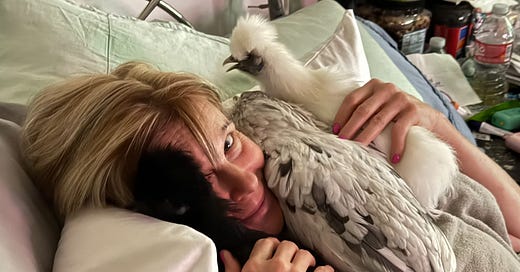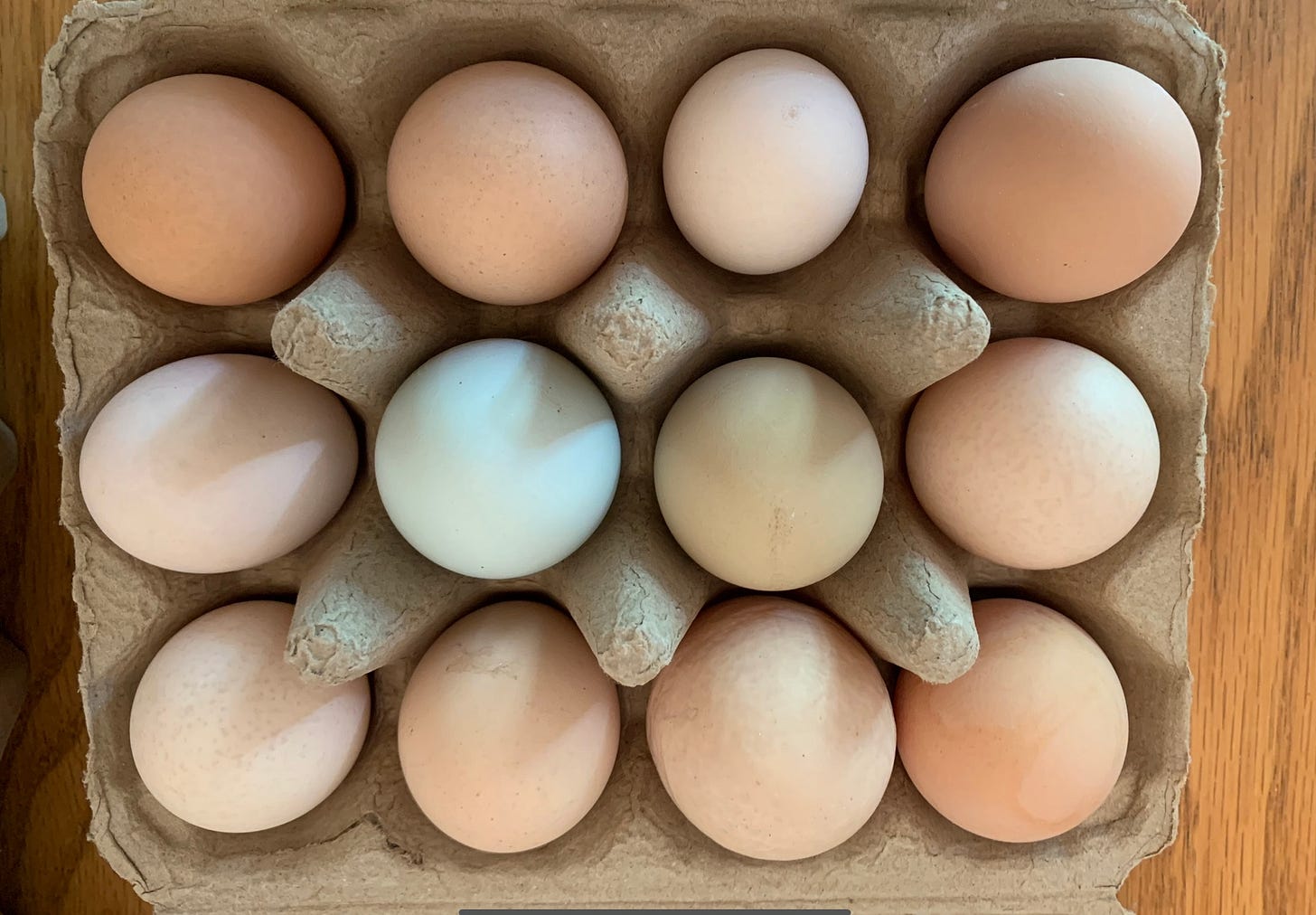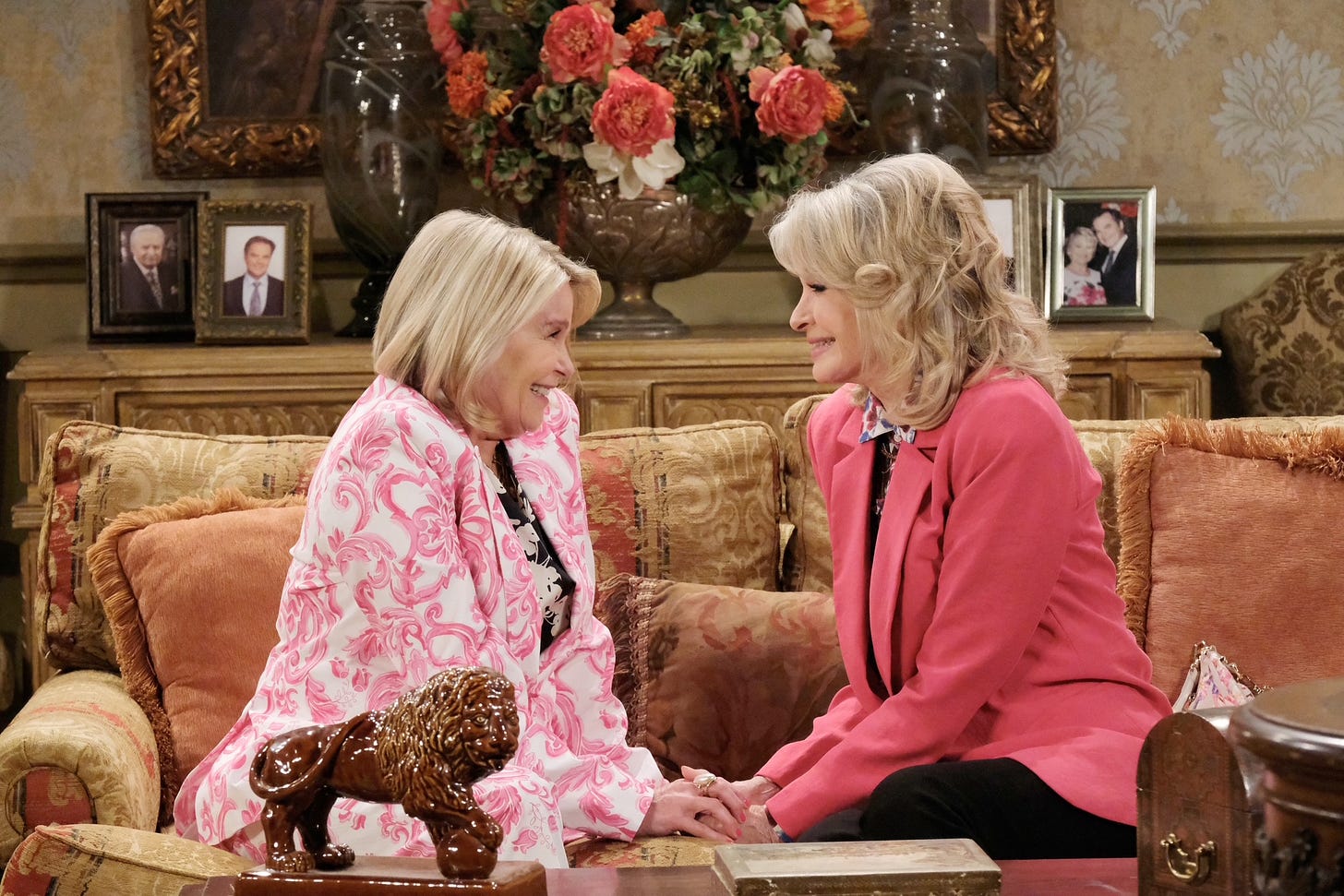Not Even High Prices Could Convince the “Crazy Chicken Lady” to Eat Free Eggs
An Emmy-winning Soap Opera Star Explains Her Fowl Obsession
Judi Evans is the most un-Hollywood of Hollywood actors. In an industry full of phonies, she is genuine. She has no ego. She doesn’t plaster on a lot of makeup when she leaves the house (except for work). She doesn’t even live in Hollywood. Her home is out in the suburbs east of Los Angeles.
However, one thing is very Hollywood about Judi. She’s bonkers. In a good way.
I’ve known Judi for years. I worked with her husband, Mike, a cameraman for CNBC. She’s spent her entire career on screen, but along the way, Judi has occasionally picked up unusual side gigs. For example, she used to moonlight selling funeral plans for a major Southern California mortuary (I once joked the job gave the Emmy-winning actress a new “plot”).
But her latest extracurricular adventure has been a home run. Judi has really gotten into chickens. Like really.
“They were calling me the ‘Crazy Chicken Lady’ until egg prices went up, and then I was the coolest kid on the block,” she tells me over Zoom while sitting in her backyard, surrounded by a flock. “We’ve never had normal animals,” she laughs. “We’ve never been normal people.”
Judi’s nine chickens lay a total of five dozen eggs a week.
That’s sixty eggs. A week. That’s a freaking gold mine. Who eats them? Not Judi! At least not at first. More on that later.
You probably know that egg prices have remained stubbornly high, so much so that people are using potatoes as Easter eggs. Canadian TV claims customs authorities this year have seized more illegal eggs than fentanyl crossing the border into the U.S.
The main cause of high prices has been a persistent bird flu. The Secretary of Health and Human Services, RJK Jr., suggested that farmers let the flu play itself out. Some veterinary scientists say that idea is kinda insane, because it might allow the virus to evolve into something that infects humans.
So raising one’s own chickens for eggs has become a thing. Entrepreneurs see an opportunity. Rent the Chicken charges about $25-$30 a week for a couple of birds — including coops and food. That will reap at least a dozen eggs. Sure, that’s more expensive than buying pricey eggs in the store, but Rent the Chicken says its chickens’ eggs are a reliable supply that contain less cholesterol and saturated fat. And they’re fresh!
Neighbors aren’t always happy with the new trend. The city council in St. Cloud, Minnesota, “put the kibosh” on backyard chicken farms over concerns that they’re “dirty birds.”
But out in California, Judi’s neighbor, Carrie Peck, says she never smells the birds, nor does she hear them. “In fact, you don’t even know they’re there.” Carrie loves getting free, fresh eggs from her neighbor. “They’re colorful, just like Judi is.”
Judi says the eggs taste like a combination of butter and cheese, and they last much longer than those you buy in the store. “Our eggs can stay unrefrigerated, on the counter, for about four to six weeks.” They last a few months in the refrigerator.
Her castmates on “Days of Our Lives,” where Judi plays the role of Bonnie, always wait in anticipation to see if she’ll bring fresh eggs to the set. I ask the obvious question — obvious to me — why not sell the eggs at a local farmers market and make a fortune? Judi’s thinking about it. “I’d have to get a permit,” she says. “It’s actually a lot of fun just to give them away.”
Judi rescued her first chicken three years ago when it was a baby. It jumped into her hand at the stables where she keeps her horses. The chick’s friendliness surprised her. “That is not usual,” she says. “Usually they run away.” The little bird showed signs of being pecked at and abused by its siblings, and Judi asked for permission to take it home.
It just happened to be Thanksgiving Day. What to name the new bird? “We thought ‘Stuffing’ was inappropriate,” Judi says, “so her name is Pie.” Other chickens followed, with names like Tay Tay (after Taylor Swift) and Hedy (after legendary starlet/genius inventor Hedy Lamarr — “she’s the toughest one”). Judi would love to have even more poultry. “I call it chicken math,” she tells me. “If one makes you happy, two will may you very happy. Ten will make you so happy.”
She says the birds are hilarious and smart. “They can recognize up to 100 faces.” Judi bonds with them, in part, because of her acting background. “I watch them, and I’m very observant of their behavior, so I try to become more like a chicken to make them comfortable.”
She also takes them places like the hardware store:
The cost of feeding her flock and keeping them healthy adds up to about $75 a week. Let’s see, 75 dollars divided by five dozen eggs equals $15 a dozen, so, well… she’s not in it to make a buck. But Judi’s birds eat like chickens (a la) kings. In addition to regular feed, there’s a lot of meat. “Our chickens like chicken,” she says. “They like eggs, too.”
Ouch.
Coyotes are a threat, so Judi usually babysits the chickens when they go free-range in the backyard. To scare away predators when she can’t be there, Judi bought one of those blow-up stickman thingies you see at car lots.
She says anyone who wants to raise chickens needs to know that it’s a lot of work to keep the birds healthy and the coops clean. But she loves it. “They’re the nicest people.”
More than anything, the birds have provided Judi and her husband with a lot of emotional support since they lost their son a few years ago. “They’ve given me so much love and friendship.”
But as I alluded to above, the craziest part of this story is that Judi and Mike haven’t been benefiting from their own good fortune. They haven’t been eating the eggs. “It was really hard for us to eat our own chickens’ eggs,” Judi admits. “I know they’re not fertilized or anything — but our throats would tighten up… because it’s their eggs.” She wouldn’t even use the eggs for baking. “Finally, I’m like, ‘This is stupid. I’m spending $10 for something I can get for free.’” So recently she gave in and started baking with her own backyard eggs. Then she even started eating them.
“They are delicious.”











You still got it, Jane. Great stories!
Great story. When is "Days of Our Chicken Lives" coming out?